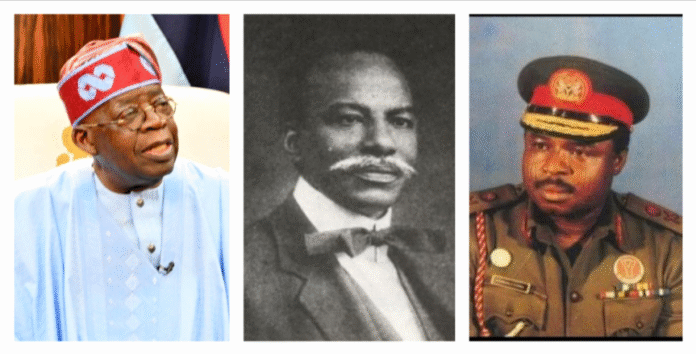President Bola Ahmed Tinubu has granted presidential pardon and clemency to 175 Nigerians, including well-known figures such as Ken Saro-Wiwa, Major General Mamman Vatsa, and Maryam Sanda, as part of efforts to promote justice, forgiveness, and national healing.
The announcement was made on Thursday following the presentation of a report by the Presidential Advisory Committee on the Prerogative of Mercy, chaired by the Attorney-General of the Federation and Minister of Justice, Prince Lateef Fagbemi, during the Council of State meeting held at the Presidential Villa in Abuja.
The beneficiaries include illegal miners, white-collar offenders, drug convicts, foreigners, and some inmates on death row. President Tinubu said the decision was based on recommendations that many of the convicts had shown remorse, good behaviour, and in some cases, old age or new vocational skills acquired while in prison.
Historical Redress and Posthumous Pardons
Among the most symbolic gestures was the posthumous pardon of Sir Herbert Macaulay, one of Nigeria’s founding nationalists, who was wrongly convicted by British colonial authorities in 1913 for misappropriation of funds. Tinubu said the pardon was to correct “a historic injustice committed against one of Nigeria’s greatest patriots.”
Also receiving posthumous pardon were Major General Mamman Jiya Vatsa, executed in 1986 for alleged coup plotting, and the Ogoni Nine, including environmental activist Ken Saro-Wiwa, who were executed in 1995 during General Sani Abacha’s regime.
The government also honoured the victims of the Ogoni crisis, naming Chief Albert Badey, Chief Edward Kobaru, Chief Samuel Orage, and Chief Theophilus Orage as part of those recognised for their sacrifices.
Notable Individuals Granted Clemency
Among the living beneficiaries are:
- Maryam Sanda, sentenced to death in 2020 for the murder of her husband, was granted clemency after six years in prison. The President considered her remorse, good conduct, and the well-being of her two children.
- Farouk Lawan, a former lawmaker jailed for corruption in 2021, was pardoned after completing his sentence.
- Professor Magaji Garba, former Vice-Chancellor of the Federal University, Gusau, convicted for fraud in 2021, had his sentence reduced due to good behaviour and old age.
- Barr. Hussaini Alhaji Umar and Ayinla Saadu Alanamu, both convicted of bribery and fraud, also benefited from the clemency.
- Major S.A. Akubo, sentenced to life imprisonment in 2009 for illegal arms removal, had his sentence commuted to 20 years for good conduct.
Illegal Miners, Drug Offenders, and Others Freed
The list also included over 60 illegal miners who were serving various prison terms across the country. Their release was tied to a rehabilitation and empowerment undertaking signed by Senator Ikra Aliyu Bilbis, who pledged to oversee their reintegration into society.
Several drug offenders and first-time convicts also received mercy after demonstrating remorse and learning new trades under the National Open University of Nigeria (NOUN) and prison skill programs.
Examples include:
- Aluagwu Lawrence (47) – sentenced for selling Indian hemp in 2015.
- Kelvin Christopher Smith (42) – jailed for cocaine importation in 2023.
- Lina Kusum Wilson (34) – sentenced to death for homicide in 2017, now granted clemency.
- Ex-Corporal Michael Bawa (72) – imprisoned for murder since 2005, freed after 20 years.
Commuted Death Sentences and Reduced Terms
The committee also recommended commuting the death sentences of seven inmates to life imprisonment, citing good conduct and repentance.
Convicts like Emmanuel Baba (38), Moses Olorunfemi (51), and Benjamin Ekeze (40) had their death penalties reduced to life imprisonment after years on death row.
In total, the President approved:
- 2 full pardons for inmates,
- 15 posthumous pardons,
- 82 clemency cases,
- 65 sentence reductions, and
- 7 commutations from death to life imprisonment.
Presidential Vision of Forgiveness
President Tinubu said the move was not just an act of mercy but a demonstration of compassion, justice, and national unity.
“This exercise is part of our moral and constitutional responsibility to give hope and a second chance to those who have shown genuine remorse and reformation,” the President said through his spokesperson, Bayo Onanuga, Special Adviser on Information and Strategy.
With this move, President Tinubu joins the ranks of Nigerian leaders who have used the Presidential Prerogative of Mercy to reform the justice system and promote national healing.
Observers say the pardon for historical figures like Herbert Macaulay, Ken Saro-Wiwa, and Mamman Vatsa marks a symbolic moment in Nigeria’s political and moral history — one that blends justice with forgiveness, and punishment with redemption.



